|
|
|
Sort Order |
|
|
|
Items / Page
|
|
|
|
|
|
|
| Srl | Item |
| 1 |
ID:
190047
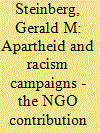

|
|
|
|
|
| Summary/Abstract |
Under the headings of promoting human rights and international law, the influential network of non-governmental organisations (NGOs) has been a central actor in the political war targeting Israel though allegations of apartheid and racism. In applying these slanders, the NGOs systematically erase the history of the Arab-Israeli conflict, including decades of warfare and terrorism, and join in the attempt to delegitimize the nation-state of the Jewish people, regardless of borders, and as distinct from criticism of Israeli policies regarding territory occupied in the 1967 war. This process constitutes the essence of post-Holocaust or ‘new antisemitism’, as included in the consensus working definition published by the International Holocaust Remembrance Alliance. The NGO campaigns are constructed on the foundations established by the Soviet and Islamic blocs culminating in the 1975 UN ‘Zionism is racism’ resolution. This theme was revived in the NGO Forum of the 2001 Durban Conference, led by Human Rights Watch, Amnesty International, and Palestinian groups such as Al-Haq, and used to justify appropriating the methods of the South African anti-apartheid campaign, including boycotts and lawfare. After the Durban conference and for 20 years since, this NGO network continued and expanded the campaign based on the apartheid and racism allegations. Their claims were amplified in media platforms, international bodies, anti-Israel church groups and on university campuses in the form of ‘Israel apartheid weeks’. European governments enabled activities of the Palestinian and Israeli NGOs through substantial funding, estimated at 120 million Euros annually. In 2020 and 2021, the NGO emphasis on these themes increased, led by HRW, and supporting the decision of the ICC prosecutor to accept jurisdiction over Palestinian claims and to open investigations against Israel. This context amplified the potency of the allegations of apartheid and racism in attempts to demonise Israel.
|
|
|
|
|
|
|
|
|
|
|
|
|
|
|
|
| 2 |
ID:
110117
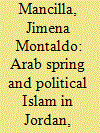

|
|
|
| 3 |
ID:
122066
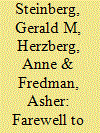

|
|
|
|
|
| Publication |
2012.
|
| Summary/Abstract |
International human rights NGOs utilize soft power resources to shape discourse on state compliance with the Laws of Armed Conflict (LOAC), as well as related policy decisions. The NGO impact is generally due to perceived expertise, credibility and commitment to universal principles. This article examines these factors in the NGO campaign in the UK calling for an arms embargo against Israel. NGO reports and activities created the basis for the July 2009 decision by the British government to cancel five military export licences. However, as shown, these reports contain problematic methodologies, inaccurate claims, and controversial interpretations of international law.
|
|
|
|
|
|
|
|
|
|
|
|
|
|
|
|
| 4 |
ID:
174261
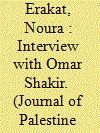

|
|
|
|
|
| Summary/Abstract |
In late November 2019, the Israeli Supreme Court upheld the Ministry of Interior's order to deport Human Rights Watch (HRW) director for Israel and Palestine, Omar Shakir. The court based its decision on a 2017 amendment to Israel's 1952 Entry into Israel Law enabling the government to refuse entry to foreigners who allegedly advocate for the boycott of Israel. The same law was invoked to deny entry to U.S. congresswomen Rashida Tlaib and Ilhan Omar in the summer of 2019. The campaign against Shakir began almost immediately after he was hired by HRW in 2016, and the court's decision marked the culmination of a multi-year battle against the deportation order. In this interview, JPS Editorial Committee member, Rutgers University professor, and author Noura Erakat discusses the details of his case with Shakir in an exchange that also examines the implications of the case for human rights advocacy, in general, and for Palestinians, in particular. The interview was edited for length and clarity.
|
|
|
|
|
|
|
|
|
|
|
|
|
|
|
|
| 5 |
ID:
123151
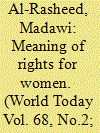

|
|
|
| 6 |
ID:
153885
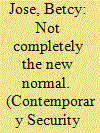

|
|
|
|
|
| Summary/Abstract |
How do human rights groups prevent the normalization of practices they find troubling? Existing international relations research provides insights into how states resist the new norms human rights activists introduce into the global arena. But it tells us less about how governments themselves promote norms and how activists push back against this advocacy. This article explores this issue by examining the interplay between Human Rights Watch (HRW) and the United States around the emerging norm of targeted killing. It argues that Bin Laden’s death opened a window of opportunity for the potential emergence of a targeted killing norm, with the United States as its norm advocate. To prevent its emergence, HRW deployed some of the same strategies states have used to suppress the emergence of norms they dislike. In illustrating these dynamics, this article helps us better understand why some norms rise, why some fall, and why they might change over time.
|
|
|
|
|
|
|
|
|
|
|
|
|
|
|
|
| 7 |
ID:
171105
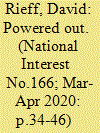

|
|
|
|
|
| Summary/Abstract |
What Samantha power was arguing for in A Problem from Hell was for Washington to make stopping genocide one of the core tenets of its foreign policy. The Education of an Idealist is essentially an how power made campaigning to push U.S. foreign policy in that direction the organizing principle of her life.
|
|
|
|
|
|
|
|
|
|
|
|
|
|
|
|
|
|
|
|
|